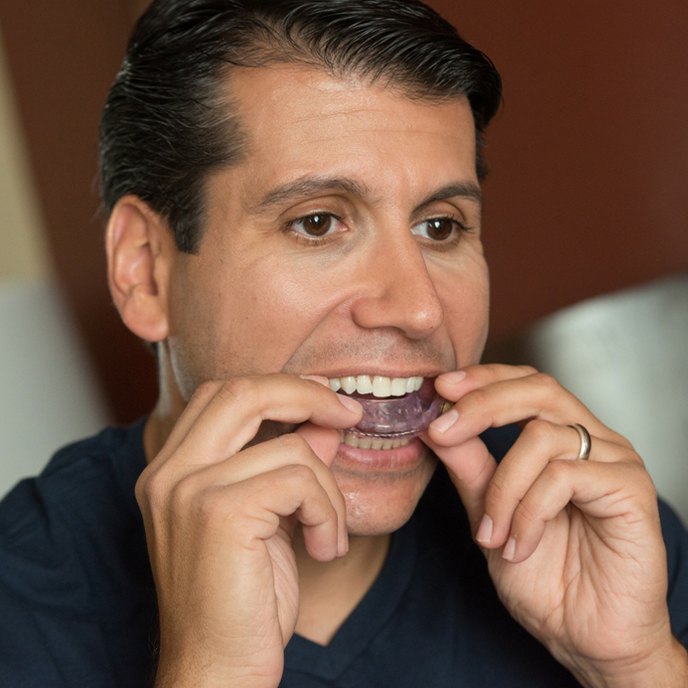Snoring isn’t just a nuisance that your loved ones have to put up with; it can be one of the biggest indicators that you have a sleep-breathing disorder known as sleep apnea. As a result, your body isn’t getting enough rest, and you could be in danger of chronic exhaustion as well as life-threatening heart problems. Dr. Cohen can help you take the necessary steps towards having your sleep apnea treated; call our dental office today to schedule a consultation to discuss sleep apnea therapy in St. Johns, FL.
What is Sleep Apnea?

“Apnea” is defined as the cessation of airflow for at least 10 seconds. People with sleep apnea will frequently stop breathing while they’re asleep. This could be because the tongue, soft palate, and/or throat tissues have relaxed and are blocking the passage of air. Whenever breathing stops, the body has a fit of wakefulness, and consequently you never enjoy the benefits of a full night’s sleep. Sleep apnea can be recognized by loud snoring, periodic awakenings while gasping for air, and daytime fatigue, often accompanied by irritability, morning headaches, and depression.
Oral Appliance Therapy

Dr. Cohen can provide a special oral appliance that’s designed to keep the airway clear so that you can keep breathing uninterrupted throughout the night. Some appliances are designed to reposition the lower jaw along with any soft tissues that could potentially block the throat; others are made specifically to hold the tongue in place to prevent it from falling backwards. In either case, your appliance will be custom-made so that it fits perfectly in your mouth.
Sleep Apnea FAQs
Does Everyone Who Snores Have Sleep Apnea?
Since snoring is one of the most common symptoms of sleep apnea, it’s easy to assume that the two go hand in hand. However, this is not always the case. There are plenty of examples of people snoring without sleep apnea being present. Meanwhile, not every case of sleep apnea is accompanied by snoring. To put it simply, merely observing snoring and other potential symptoms of sleep apnea is not enough for a diagnosis; you will need to have a sleep test performed in order to confirm whether you are suffering from the disorder.
Will Oral Appliance Therapy Make CPAP Therapy Unnecessary?
Many people who seek oral appliance therapy for sleep apnea do so because they dislike using CPAP therapy. While CPAP machines are effective for keeping the airways open throughout the night, they also make a lot of noise, and they can be uncomfortable. For those with mild or moderate sleep apnea, switching from CPAP therapy to oral appliance therapy can sometimes be a viable option. Of course, you’ll need to speak to your dentist as well as your sleep doctor to make sure that this is the right choice for you.
Will My Sleep Apnea Go Away If I Lose Weight?
Sleep apnea is often closely related to obesity. People who are overweight are significantly more likely to suffer from sleep-disordered breathing. As such, losing weight can often make sleep apnea symptoms significantly less severe. That said, there’s no guarantee that it will completely solve the problem; even after you lose weight, your sleep apnea might persist. You can check whether you still have the disorder by undergoing another sleep test.
Can I Have Oral Appliance Therapy If I Grind My Teeth?
Some people with sleep apnea also have bruxism, which is a condition that causes nighttime grinding of the teeth. You might be worried that bruxism could be an obstacle to having oral appliance therapy performed, but this couldn’t be further from the truth. A high-quality oral appliance will be able to easily stand up to the forces of teeth grinding, so you can wear it without worry. In fact, the appliance can actually protect your teeth from bruxism-related damage, which can be an excellent side benefit.


